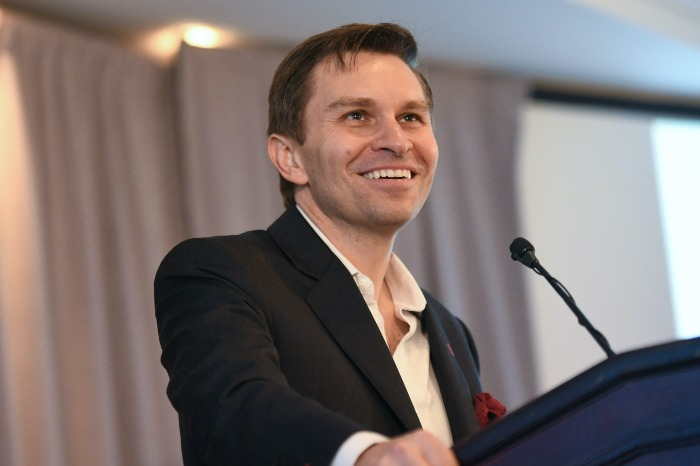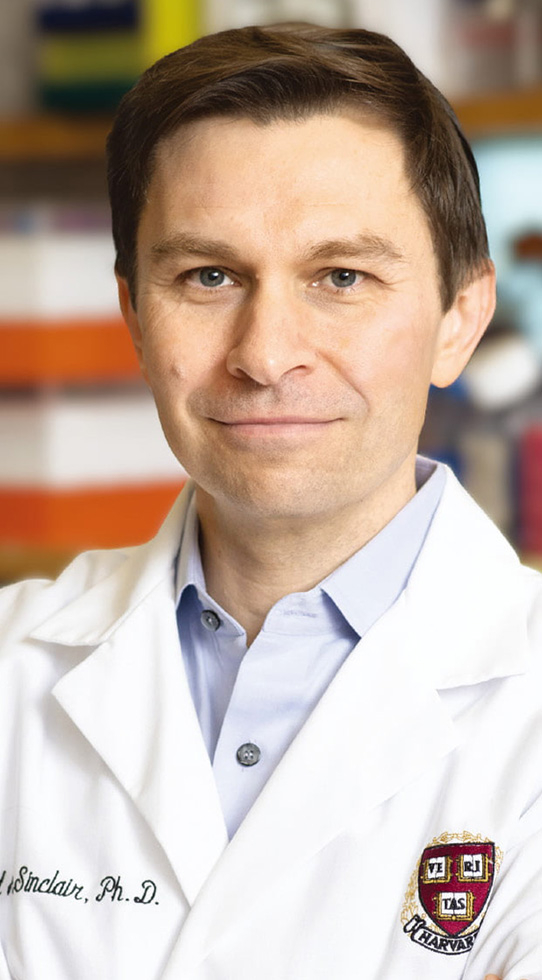Bio & Pharma
Reversing age possible in a decade: Harvard Prof. David Sinclair
Aging is a disease, and people will be able to live to 120 years old if research on aging treatment continues
By Mar 18, 2024 (Gmt+09:00)
long read
Most Read
LG Chem to sell water filter business to Glenwood PE for $692 million


KT&G eyes overseas M&A after rejecting activist fund's offer


Kyobo Life poised to buy Japan’s SBI Group-owned savings bank


StockX in merger talks with Naver’s online reseller Kream


Meritz backs half of ex-manager’s $210 mn hedge fund



Humans will be able to control biological age and reverse their age in 10 years with advancements in medical science and live up to around 120, about 40 years longer than the current average age of death, said renowned Harvard University geneticist and longevity researcher and Professor David Sinclair.
“We see that most people don't believe it's possible because it hasn't happened ever,” Sinclair said in a recent interview with The Korea Economic Daily. “But we know, just like the Wright brothers, that we have the knowledge and the beginnings of information to reverse aging…. It's really only a question of when.”
“And my belief is that it's going to happen in the next 10 years, 10 years probably sooner that we can control our biological age.”
Sinclair, the author of the best-seller book “Lifespan: Why We Age―and Why We Don't Have To,” is a tenured professor in the Department of Genetics at the Paul F. Glenn Center for Biology of Aging Research at Harvard Medical School.
Best known for his work on understanding why people age and how to slow its effects for over 30 years, Sinclair, also one of TIME magazine’s “100 Most Influential People in the World,” spoke to The Korea Economic Daily about his longevity research on treatments for aging as a disease.

Q&A
THE KED: Please explain the significance of your anti-aging research in detail and how it affects the human future.
SINCLAIR: There have been several moments in human history where an event changes the world so much that it can never be the same.
And flight is a very good example. It was one moment really when things were never going to be normal before the Wright brothers. It was a world where only birds could fly,… up until the Wright brothers, most people believed flying was impossible. But as soon as it happened, everybody had to believe it.
And what is going to happen with aging research is the same. We see that most people don't believe it's possible because it hasn't happened ever. But we know, just like the Wright brothers, that we have the knowledge and the beginnings of information to reverse aging. And so it is no longer a question of if this will happen. It really is only a question of when.
And my belief is that it is going to happen in the next 10 years, 10 years probably sooner, that we can control our biological age…. And we're also going to look back at today and say people were dying when they didn't need to prematurely... I'm not saying that we're going to cure aging, but I am saying that we die of diseases that are unnecessary.
THE KED: Can you elaborate on this?
SINCLAIR: With today's technology that is available on the cutting edge with the DNA tests, the body scanning, (and) the blood tests, the monitors well, these little monitors, increasingly better monitor our bodies. I believe that the major killers of society now are preventable…. I mean I already looked at a few years ago when we had to get sick before we went to the doctor and had a tumor and a cancer and then it was often too late. We're now at a time in history where you don't have to get sick before you can find a tumor and kill it.
THE KED: With the combination of cutting-edge medical technologies and anti-aging research, will it be possible for people to live more than 150 years old?
SINCLAIR: I don't know about 150. That is a long time but we know that people can live to 120.
And so the average age of death is 80 right now…. So we've got 40 years that we know we can play with beyond 120. I think that is going to be possible for not immediately but it is the same with the Wright brothers…. It took many decades but I know just like the Wright brothers that that day is coming when we will have medicines that can truly reverse aging. And one day people will live to 150 in a healthy way.
It's not like in 10 years everybody will live to 120 because these drugs will not be widely available, they may be expensive and you might need three or four medicines to reach 120. But it will just become more and more common in the same way all with new technologies.

THE KED: Of the three main anti-aging methods – cell reprogramming, zombie cell elimination with senolytics and development of drugs mimicking specific genes found in organs and tissues, what will be commercialized the first?
SINCLAIR: Well, the two that are most advanced are number two and number three. Number two, there has been success in humans in improving vision in macular degeneration, killing zombie cells in the retina.
And in the case of number three, … we do have molecules that activate the sirtuin genes and those have been tested in humans. And they improve health and they might end up being on the market in the next few years.
Both types of drug. Number one, the reprogramming, (however,) has not been tested in humans yet. The closest is (tests on) monkeys and that’s (been done) at my company, called Life Biosciences, and there it is working really well to cure blindness. Yes, so we want to test (it) in human glaucoma next year.
THE KED: Tell me the significance of your reprogramming blind mice research findings published recently in “Cell.”
SINCLAIR: What was important about that was not that we cured blindness as much as we showed that it is possible to reverse aging safely. No one had actually done that before. It either came with sickness or cancer. And we found a way that is super safe (and) that does not cause cancer no matter what you do and in the animals at least.
And the other important point is we didn't choose the eye because it was easy. We chose it because it was hard. And what this means is that it should work in the rest of the body as well.
We're now reversing aging in the brain of mice and it should work in other tissues. It's just the beginning. The eye is not the point. The eye was the first case.
THE KED: Tell me how you have been expanding your research.
SINCLAIR: We made a virus that targeted the mouse brain and that's how we reversed the agent brain and got the mouse to remember things again and learn again. And so what we're doing now is giving mice the virus in different parts of the body or the whole body.
There's a study that's just coming out by a group that is using our technology. They gave it to very old mice that were 25 months old, which is the equivalent of an 80-year-old human. And they are going to show in their paper that the mice live another 109% again of the remaining lifespan. So if they had two months, they got four and a bit months more which is a big deal…. It's such a late stage. So that's good news. It may not be too late even for people who got 80 or 90.

THE KED: Considering that the study of slowing down aging is still in its early stages, isn’t reversing aging a distant future?
SINCLAIR: Well 10 years ago I was considered crazy talking about reversing aging. In fact, somebody told me I should not use those words but now it is normal to talk about reversing aging, not just slowing it down.
And we can clearly see that there are some drugs that when you give them to mice they behave younger (and) they have more strength (and) endurance…. Reversal is real. It's just around the corner.
THE KED: As you said, aging is the main factor that drives symptoms like cancers and sarcopenia. But the FDA has not yet classified aging as a disease. What is your view on this?
SINCLAIR: Right so. I was the first person to say aging should be a disease. And again, it was considered crazy 10 years ago. Now a lot of people agree (on it), and one argument is that aging is the same as a disease.
The definition of a disease is that people get sick and die. That is what aging does.
And the FDA is already open to declaring aging a treatable condition. They just want to see some evidence that it's possible. And so the TAME, or Targeting Aging with Metformin, trial is underway.
(The TAME Trial is a series of US nationwide, six-year clinical trials to confirm the efficacy of metformin, an FDA-approved drug used successfully to treat diabetes for more than 60 years, in delaying the development or progression of age-related chronic diseases.)
They had just started and that is designed to show the FDA that you can treat aging. And so maybe in the next five years, the FDA will (classify aging as a disease).
THE KED: Is there anything you would like to tell to readers?
SINCLAIR: I want to end by talking about my father. He's the opposite of my mother. My mother didn't care about her health. She smoked, she didn't exercise, she didn't eat very healthily and she died painfully suffering for 20 years at the age of 70.
My father looked at the science, looked at my research, started exercising (and) started skipping meals in his 60s. He's now 84. He feels like the same as he did when he was 40. He has no diseases ... He has not even an ache or a pain. He can see perfectly. He doesn't even need glasses to drive a car at nighttime and he's having the time of his life.
That is the kind of life I want for everybody to not die in their 70s horribly and not worry about heart disease and cancer ….
He had no problem getting on a plane and he just went through Europe for two months. You know, that's not a typical 84 year old.
Write to Jeong Min Nam at peux@hankyung.com
Sookyung Seo edited this article.
More to Read
-
 Bio & PharmaSamsung Biologics signs ADC CDO deal with LegoChem Bio
Bio & PharmaSamsung Biologics signs ADC CDO deal with LegoChem BioFeb 07, 2024 (Gmt+09:00)
3 Min read -
 Bio & PharmaNKMax to perform first tests on dementia cell therapy in US
Bio & PharmaNKMax to perform first tests on dementia cell therapy in USOct 26, 2023 (Gmt+09:00)
1 Min read -
 Bio & PharmaNGeneBio applies for US patent of early diagnosis tech of dementia
Bio & PharmaNGeneBio applies for US patent of early diagnosis tech of dementiaSep 14, 2023 (Gmt+09:00)
1 Min read -
 Culture & TrendsS.Korea's elderly population to exceed 10 million in 2024
Culture & TrendsS.Korea's elderly population to exceed 10 million in 2024Feb 28, 2023 (Gmt+09:00)
1 Min read -
 EconomyS.Korea forecast to have world's oldest population by 2070
EconomyS.Korea forecast to have world's oldest population by 2070Sep 06, 2022 (Gmt+09:00)
2 Min read
Comment 0
LOG IN


